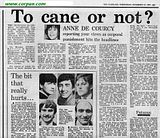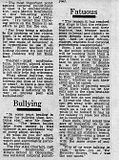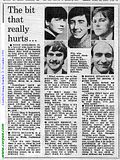The Standard [temporary name for the London Evening Standard], London, 21 November 1984To cane or not?Anne de Courcy reporting your views as corporal punishment hits the headlines
The controversy on corporal punishment has hit the headlines again with the clash between headmaster Charles Oxley (the man who infiltrated the Paedophile Information Exchange recently) and the anti-caning activists, STOPP. Few aspects of school life arouse so much emotion as corporal punishment. When I asked the other day: Did being beaten at school affect you, and if so, how? letters poured in. Surprisingly, they split four to one in favour. Personally I can't imagine any situation where I would want either to strike or be struck -- let alone for the reason given by another of my readers:
"Hardly an English lesson passed when at least four of us were not caned for submitting poor work. I remember becoming sick with worry and petitioning my parents desperately to be allowed out of the 'fast lane' but it was only when my father died that my mother would write a note agreeing to this. All the research that has been done shows that in schools of comparable social intake behaviour is worse if there is corporal punishment. In 1976 there were 69 assaults by London pupils on teachers; from 1981, when ILEA's ban against corporal punishment in their schools came into effect, the average dropped to 35. "The most important point against corporal punishment is that it is counterproductive," says Martin Rosenbaum of the 700-strong society, whose patron is Lady Plowden. "It's rather like throwing petrol on the flames in an effort to put the fire out. Bullying"In some ways beating for bullying is worse than anything else," says Mr Rosenbaum. "The lesson bullies take from caning is that violence is an acceptable way of going about things." So what do you do? apart, that is, from keeping a close watch and encouraging parental co-operation. The Rev Alan Charters, just appointed headmaster of King's School in Gloucester, has outlawed corporal punishment. He says: "What they really hate is the restriction of privileges. Apart from all the other stresses of growing up, says Mr Charters, boys and girls today are under enormous pressure both academically and socially "and it's not our job to add to it -- as I am sure the tension and fear caused by corporal punishment does add." Fatuous"The reason it has reached this stage is that the relationship between boys and their teachers has become much more informal and friendly in most schools than 20 years ago. And in these circumstances, teachers find corporal punishment inappropriate." Just a few of your letters . . .WHEN I was at school virtually all children who were naughty expected and received physical punishment from teachers and parents. I WAS hit with a ruler for talking to a friend in class when I was about eight. I can still feel the shock I felt then, looking at a smear of blood on the back of my hand. I WAS smacked by my mother -- if she hadn't she would have had a tyrant on her hands. I'm so glad she chastised me when I got out of hand. I believe early discipline is very necessary. --Mrs Wyman, Weybridge. I AM 86 and can still remember being caned and my name being put in the dreaded punishment book for eating sweets in the classroom while knowing they were forbidden. I WAS only thrashed once and it was richly deserved. I was 15 and with a group of schoolfriends went shop-lifting. I WAS caned on three occasions at my junior school in England some 30-odd years ago. CANING for me was disastrous and turned my life into a desert. It is both monstrous and petty; an act of sexual violence committed without consent against children and young people. -- R. Brandon, London. W14.
The bit that really hurts . . .
-- TONY SNELSDON, 27, is a lawyer who went to the Jesuit college of Beaumont, where they used a ferrula, (a long piece of whalebone covered with leather). "I must have been beaten about twice a week, which put me near the top of the first division. It was a most unbearable experience -- very frightening to climb those old stairs, walk along that creaking corridor, rap on the door and go in to stand there trembling while this old priest wrote the offence down in a black book. "Sometimes you'd go there early and run away, but eventually, of course, you always went in. You had friends waiting downstairs in the washrooms with basins of water of different temperature -- everyone had a theory about whether it was best to plunge your hands straightaway into hot water or cold. "Every time it happened, I thought, 'I'm not going to misbehave anymore,' not so much because of the pain -- when you did cry it was just as much anger -- as the build-up. After the priest had whacked you, you had to thank him." -- STEVE BULLOCK is a 36-year-old lawyer who went to Wells Cathedral School. "Now it's very liberal, then it was as close as you can get in the Anglican Church to a monastery. They whacked you for just mucking about, in a very arbitrary way. "What worries you is the anticipation, not the actual pain. We were always beaten the following day, so we had a 24-hour build-up and this is what freaks you out. "It didn't make the slightest bit of difference. The kids that are going to reform on the threat of the cane will do so without being beaten. "The whole thing is it's cold and calculating -- I only hit my children if they're really winding me up. I don't think people at school should be beaten except for outrageous behaviour."
-- STUART BRIDGE, 19, was at Mayesbrook Comprehensive. He was caned twice, once for fighting and once for playing penny-up-the wall, a game where you throw pennies at a wall and the one nearest the wall keeps the other pennies. He was, he says, only watching, not playing. "It was only one stroke, but I thought it was rough justice. It didn't stop me, just stung for a while. I don't think it's right." -- DANNY SULLIVAN, 17, was caned for missing a games lesson. "My mates locked me into the cloakroom for a laugh -- but although they locked me in, I was the one caned. "Caning didn't have any effect on me -- it only stung a little and then you'd go and big-mouth it to your mates 'I've just been caned!'" -- STEVE BARNES, 25, says of his grammar school that while caning was official policy it was used only once or twice during his time. "It was a distant threat for a gross breach of discipline rather than anything else -- one or two teachers weren't able to keep discipline. If people got out of hand, or were violent or played truant, there was this thought hanging over them. "I haven't really thought whether I agree with it or not, except that I do believe punishment of that sort is something for a parent to take care of, and I certainly wouldn't want a teacher doing it to any child of mine without my knowing." |
About this website |



 Five who suffered, clockwise from bottom left: Steve Barnes, Stuart Bridge, Danny Sullivan, Tony Snelsdon, and Steve Bullock.
Five who suffered, clockwise from bottom left: Steve Barnes, Stuart Bridge, Danny Sullivan, Tony Snelsdon, and Steve Bullock.